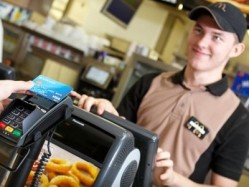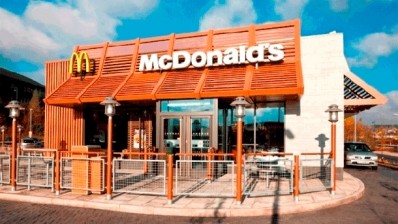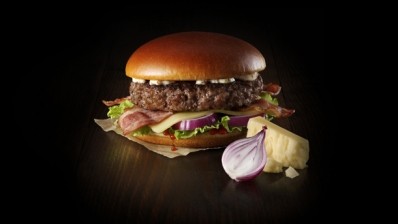Serving the UK: McDonald’s at 40

McDonald said: “This year marks 40 years of McDonald’s serving the UK. We now have over 1,200 restaurants in communities throughout the UK and together with our franchisees, serve millions of customers every day, and create jobs and opportunities for local people and local businesses.
“The last 40 years have been quite a journey, and as we approached our anniversary year, we wanted to use the milestone to understand more about the value we deliver to the UK today, to help our many stakeholders understand us better and to inform our own future decision making.
“In this report you will be able to read about the positive contribution we make to our people, to our customers, to the communities we belong to and to the national economy. The process of collecting and analysing current and historical data has been extensive and I hope you will find a richness of insight that gives you a deeper perspective on our business here in the UK.
“For us, we now know much more about the economic and social impacts of our restaurants and UK supply chain and the real differences we can make to people’s lives. I’m incredibly proud that since we opened the doors of our first UK restaurant in Woolwich in 1974, we have supported the creation of 1.5 million UK jobs, within our own business and across our supply chain, which have provided people with opportunities.
“Our commitment to source locally, whenever it makes sense, has seen us spend over £26bn with UK-based businesses over our 40 years, which has helped deliver a total contribution by McDonald’s UK of £40bn to the British economy. Understanding this contribution has galvanised us to do even more in the future. Looking ahead, we will continue to put our customers first, focus on our people and maintain our commitments to communities and to the businesses we work with to help them prosper – because when they prosper, we do too.”
Key facts:
Since the first store opened in the UK in Woolwich, South East London, in 1974, the company estimate that it and its suppliers have had a cumulative impact on the UK economy totalling £40.3bn in 2013 prices. This is equivalent to the combined economic output of Belfast, Cardiff, Edinburgh and York in one year.
Over the 40 years it calculates that: 1.5 million people in the UK have either worked in McDonald’s and its franchises, or have been employed by its suppliers as a result of purchasing by McDonald’s.
The group’s aggregate investment in new restaurants and equipment in the UK is equivalent to expenditure of around £3.3bn.
Cumulative expenditure with suppliers in the UK is estimated to total £25.7bn.
Contribution to economy
In 2013, the company estimates that it contributed a total of £2.505bn of GVA to the overall value of the UK economy. This includes direct value added activity such as the preparing and serving of food that takes place within restaurants, which represents 52% of the contribution to GVA.
The indirect activity that takes place within the businesses in the supply chain represents 28% of the contribution. The economic activity that is supported by the spending as a result of the wages paid to employees, represents 20% of the economic impact.
McDonald’s said its direct impact on the economy is through serving its customers throughout its 1,200 restaurants across the UK. The direct impact is measured as the difference between the sales generated from selling its food and the costs of making and selling its food.
An essential element of the direct impact of the business are the 94,600 people who are employed in restaurants. Of the total impact of the business, it estimates that the value that is added directly by McDonald’s totalled £1.301bnin 2013. This consists of the net income to McDonald’s and franchisees and salaries paid to employees.
A further £0.706bn of value added is estimated to have been created indirectly, in other UK businesses that form McDonald’s supply chain. This includes the businesses that supply the food and ingredients served in its restaurants as well as all the other businesses in the UK that enable McDonald’s to operate, from Martin Brower which runs the distribution network through to Smith Anderson, the company that makes McDonald’s paper bags.
In addition, another £0.499bn of value added is created as a result of the multiplier effects of the spending by McDonald’s employees as well as the employees of businesses in the supply chain whose jobs are dependent on purchasing made by McDonald’s.
Number of jobs created
In 2013, McDonald’s supported 130,600 jobs in the UK economy comprising the following: A total of 94,600 employees working either in McDonald’s restaurants or franchises across the UK. This comprises 41,600 full-time employees, 52,400 part-time staff working in restaurants and a further 500 employees working in head office.
In addition, 13,600 jobs are supported in businesses in the UK supply chain providing goods and services to McDonald’s, with 2,500 jobs in the agricultural sector alone and a further 3,000 jobs in the manufacturing of food. These 2,500 agricultural jobs include people working in the production of beef, poultry and pork as well as the growing of cereals, potatoes, fruit and vegetables across the country.
The earnings of McDonald’s employees and the employees of suppliers whose jobs are dependent on the purchasing by the company are estimated to support a further 22,400 jobs across the UK economy.
Adding up the number of employees working in McDonald’s restaurants each year since 1974, and making an allowance for the level of turnover in staff each year, indicates that a total of 1.4 million people have worked for McDonald’s in the UK over the past 40 years.
The company said that when all direct, indirect and induced jobs are factored in, it estimates that a cumulative total of 1.5m people have been employed across the UK as a result of the McDonald’s business over the past 40 years.
Ongoing investment in restaurants and supply chain
In 2013, the business invested £95m in new stores, refurbishments and equipment. This investment is estimated to provide employment for around 1,000 people working in the manufacturing, construction and service sectors of the UK economy.
Over the last five years, the company said that the total value of the investment made by McDonald’s in new restaurants and in refurbishment of older ones in the UK has been £428m. Over the last 40 years, it conservatively estimates that the aggregate investment into new restaurants and equipment in the UK is equivalent to expenditure of around £3.3bn in today’s prices.
Across the supply chain as a whole, the company said that suppliers have told it of a further £105m of investment in equipment and facilities that is directly attributed to supplying McDonald’s. This includes investment in new premises to facilitate improved environmental performance, new production lines which enable increased production and new equipment allowing for continual improvement in processes.
Expenditure benefiting other UK businesses
During 2013, McDonald’s spent £1.057bn with over 100 direct suppliers based in the UK. This is estimated to have supported a further £946m of additional expenditure throughout the UK supply chain, with thousands of businesses involved indirectly, including the many farmers supplying the primary produce used in the McDonald’s menu.
It therefore estimates that in 2013, total attributable expenditure with UK businesses throughout McDonald’s supply chain was £2.002bn.
It said that this expenditure supports economic activity across a wide number of businesses in all sectors of the UK economy. Translating this expenditure into GVA and jobs indicates that 13,600 people are employed throughout the supply chain, with the economic activity involved in supplying McDonald’s generating £706m in GVA.
£228m of Gross Value Added and about 40% of the jobs supported by McDonald’s elsewhere in the UK economy are in the food and agriculture sector. A third of the value added occurs within the farming sector, with the rest of the value added activity generated within the food processing sector, such as the businesses that are making the beef patties and bread products used in McDonald’s menu.
Altogether, just over 50% of the supply chain impacts accrue in the manufacturing and agriculture sectors. The largest proportion of direct spending in the rest of the manufacturing sector in the UK is on paper packaging products. This represents a third of the overall contribution to other manufacturing, with a range of other items such as rubber and plastic products as well as machinery, also used in the supply chain.
With over 1,200 restaurants and a significant ongoing investment programme, there are 2,000 people employed in the property and construction sector. Just over half of the jobs are in construction-related activities such as renovating existing restaurants and building new ones.
A further 10% of the benefits from McDonald’s accrue to the transportation and distribution sector, which includes the storage and movement of goods within the supply chain and the supply of products to restaurants.
Energy and utilities represents 7% of the total GVA impact on the supply chain, which is split fairly evenly between fuel used in transport and the energy used in the restaurants and processing activities.
UK service sector businesses also form a significant part of the supply chain, with some 3,100 jobs support across businesses such as legal, accounting, recruitment, IT, publishing and advertising.
Over the 40 years, expenditure with suppliers in the UK is estimated to total £25.7bn in today’s prices.
Contribution to the exchequer
In 2012, the activities of the restaurants operated by McDonald’sand its franchisees contributed an estimated £700m in tax revenues to the Exchequer through income tax, corporation tax, VAT and business rates.
In the last five years it is estimated that this cumulative contribution amounts to an approximately £3.1bn.
This article appeared first on M&C report, to subscribe contact Emily.croft@wrbm.com or call 01293 846578















